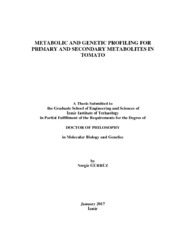Please use this identifier to cite or link to this item:
https://hdl.handle.net/11147/5714Full metadata record
| DC Field | Value | Language |
|---|---|---|
| dc.contributor.advisor | Doğanlar, Sami | - |
| dc.contributor.author | Gürbüz, Nergiz | - |
| dc.date.accessioned | 2017-06-07T10:56:52Z | - |
| dc.date.available | 2017-06-07T10:56:52Z | - |
| dc.date.issued | 2017-01 | - |
| dc.identifier.citation | Gürbüz, N. (2017). Metabolic and genetic profiling for primary and secondary metabolites in tomato. Unpublished doctoral dissertation, İzmir Institute of Technology, İzmir, Turkey | en_US |
| dc.identifier.uri | http://hdl.handle.net/11147/5714 | - |
| dc.description | Thesis (Doctoral)--Izmir Institute of Technology, Molecular Biology and Genetics, Izmir, 2017 | en_US |
| dc.description | Full text release delayed at author's request until 2020.03.23 | en_US |
| dc.description | Includes bibliographical references (leaves: 149-191) | en_US |
| dc.description | Text in English; Abstract: Turkish and English | en_US |
| dc.description | xii, 208 leaves | en_US |
| dc.description.abstract | Understanding the metabolic content of plants and its genetic basis is important to determine the most appropriate breeding strategies for traits such as yield, fruit quality, nutritional content, tolerance to disease factors, adaptation to various environmental conditions, and tolerance to abiotic and biotic stresses. Recently, post-genomic studies such as metabolomics, proteomics and transcriptomics are attracting attention and being used in conjunction with genomic studies. These studies help to speed research progress with crops as well as model plants. Tomato (Solanum lycopersicum) is an important crop which is cultivated widely in the world and in our country, and is also important for our daily diet. Although there is growing attention to studies on tomato day by day, there are limited studies that identify the quantitative trait locus (QTL) regions responsible for important agronomic, economic, nutritional and health related traits by correlation of metabolomics and genomics data. In this study, an interspecific IBL (inbred backcross line) population derived from the cross S. lycopersicum cv. Tueza x S. pimpinellifolium (LA1589) was both genotyped via genotyping by sequencing (GBS) and quantified for primary and secondary metabolites affecting yield, quality and nutritional value of the fruit to determine QTL regions for the targeted metabolites. In total, 187 QTLs were identified for 143 important traits. The data obtained from this study will help to shed light on the genetic control of plant metabolism and to develop high yield and nutrient-rich cultivars with improved agronomic traits by breeding strategies. | en_US |
| dc.description.abstract | Bitkilerin metabolik içeriklerinin ve genetik esaslarının anlaşılması verim, meyve kalitesi, besinsel içerik, hastalık etmenlerine dayanıklılık, farklı çevre koşullarına adaptasyon, abiyotik ve biyotik stres töleransı gibi karakterlerin ıslahı için en uygun ıslah stratejilerinin geliştirilmesinde önemlidir. Son zamanlarda genetik çalışmalar ile birlikte metabolomik, proteomik ve transkriptomik gibi post-genomik çalışmalar da ilgi çekmektedir. Bu çalışmalar model bitkilerde olduğu kadar tarla bitkilerinde de yapılan araştırmalara hız kazandırmıştır. Domates (Solanum lycopersicum) dünyada ve ülkemizde geniş ölçüde tarımı yapılan ve günlük diyetimizde önemli bir yer tutan tarım ürünlerinden birisidir. Günden güne domateste yapılan çalışmalara ilgi artmasına rağmen, önemli agranomik, ekonomik, besinsel ve sağlıkla ilgili karakterlerden sorumlu kantitatif karakter lokus bölgelerini belirleyen sınırlı sayıda çalışma vardır. Çalışmamızda hedef metebolitlerden sorumlu QTL bölgelerinin belirlenmesi için S. lycopersicum cv. Tueza x S. pimpinellifolium (LA1589) çaprazlanması ile ilde edilen interspesifik IBL (inbred geri çaprazlanmış hat) populasyonu hem sekans ile genotiplemeyle (GBS) genotiplenmiş hem de meyvenin verimini, kalitesini ve besinsel içeriğini etkileyen birincil ve ikincil metabolitler ölçülmüştür. Toplamda 143 önemli karakter için 187 QTL tanımlanmıştır. Bu çalışmadan elde edilen veriler bitki metabolizmasının genetik kontrolünü aydınlatmaya ve geliştirilmiş agranomik karakterler ile verimi ve besinsel içeriği yüksek olan kültürlerin geliştirilmesi için ıslah çalışmalarına yardımcı olacaktır. | en_US |
| dc.language.iso | en | en_US |
| dc.publisher | Izmir Institute of Technology | en_US |
| dc.rights | info:eu-repo/semantics/openAccess | en_US |
| dc.subject | Quantitative genetics | en_US |
| dc.subject | Tomato | en_US |
| dc.subject | Solanum lycopersicum | en_US |
| dc.subject | Quantitative trait locus | en_US |
| dc.subject | Metabolic content | en_US |
| dc.title | Metabolic and Genetic Profiling for Primary and Secondary Metabolites in Tomato | en_US |
| dc.title.alternative | Domateste Birincil ve İkincil Metabolitler için Metabolik ve Genetik Profilleme | en_US |
| dc.type | Doctoral Thesis | en_US |
| dc.institutionauthor | Gürbüz, Nergiz | - |
| dc.department | Thesis (Doctoral)--İzmir Institute of Technology, Molecular Biology and Genetics | en_US |
| dc.request.email | gurbuz_nergiz@hotmail.com | - |
| dc.request.fullname | Nergiz Gürbüz | - |
| dc.relation.publicationcategory | Tez | en_US |
| local.message.claim | 2022-06-15T14:15:39.654+0300 | * |
| local.message.claim | |rp02683 | * |
| local.message.claim | |submit_approve | * |
| local.message.claim | |dc_contributor_author | * |
| local.message.claim | |None | * |
| dc.identifier.wosquality | N/A | - |
| dc.identifier.scopusquality | N/A | - |
| item.openairecristype | http://purl.org/coar/resource_type/c_18cf | - |
| item.languageiso639-1 | en | - |
| item.openairetype | Doctoral Thesis | - |
| item.grantfulltext | open | - |
| item.fulltext | With Fulltext | - |
| item.cerifentitytype | Publications | - |
| crisitem.author.dept | 04.03. Department of Molecular Biology and Genetics | - |
| Appears in Collections: | Phd Degree / Doktora | |
Files in This Item:
| File | Description | Size | Format | |
|---|---|---|---|---|
| T001583.pdf | DoctoralThesis | 4.44 MB | Adobe PDF |  View/Open |
CORE Recommender
Page view(s)
350
checked on Mar 31, 2025
Download(s)
352
checked on Mar 31, 2025
Google ScholarTM
Check
Items in GCRIS Repository are protected by copyright, with all rights reserved, unless otherwise indicated.